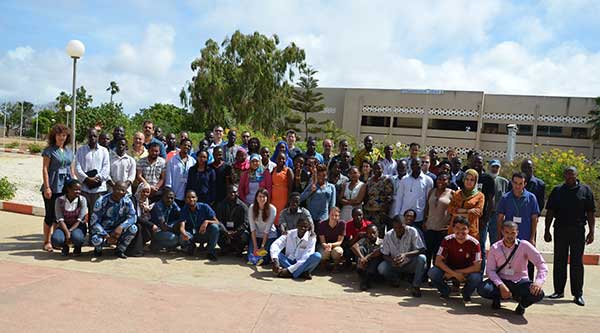Bringing Fundamental Physics and its Applications to Africa
Christine Darve

The third biennial African School of Fundamental Physics and its Applications (ASP2014) took place at the UCAD (Université Cheikh Anta Diop de Dakar), Senegal, August 3-23. The 56 students selected and financially supported to attend the ASP2014 three-week course came from 21 African countries in addition to one student from Iran, and another one from the USA. The diversity of countries of origin was enhanced by the diversity of education background, academic levels and 32 % of female students. Students learned about theoretical, experimental and applied physics from leading international scientists. Most of the students are pursuing or have completed advanced degrees in physics, but lack opportunities to gain specialized knowledge in fundamental physics. ASP provides them a professional network.
The aim of the ASP is to build capacity for harvesting and interpreting the results of current and future physics experiments using elementary particles and to increase proficiency in related applications, such as medicine, material science and information technology. The ASP2014 program evolved slightly over the previous ones (ASP2010, Stellenbosch, South Africa and ASP2012, Kwame Nkrumah University, Ghana) by taking into account the feedback from students and lecturers; there is more emphasis now on, for example, digital libraries, the Grid, Geant4 and MC Generators.
The ASP2014 local organizing committee provided a remarkable effort to support the ASP international and advisory committees in organizing this successful event. A broad spectrum of international institutes have sponsored this initiative at different levels. The main sponsoring institutes are the International Centre for Theoretical Physics (ICTP), INFN and CERN. In addition, the International Telecommunication Union (ITU) provided 10 scholarships to students from the least developed countries, including 5 female students, and the EU-funded CATHI Marie Curie Initial Training Network supported 9 students. The American contributions originate from APS, IUPAP, NSF, NSRC, JLab, FNAL, BNL, SLAC, Sandia National Laboratory, the University of Chicago, the University of Texas in Arlington as well as Kansas, Rutgers, Louisiana Tech and Oklahoma Universities. ASP2014 financial support also comes from Europe, Africa and Asia thanks to IBS/RISP (Korea), Shui-Chin Lee Foundation for Basic Science (Taiwan) and from the South African government (DST/NRF).
Beyond the academic mission, a "Forum and Outreach" event took place on 16 August, organized with students, lecturers and local policy makers. This year, they were honored to welcome the Secretary-General of the ITU, Dr. Hamadoun Touré, who gave an inspiring speech highlighting the prime importance of disciplines like mathematics, sciences and especially physics as vectors of development in Africa. The day also served to emphasize the development of the Digital Library thanks to the effort of CERN and UNESCO, as well as briefly mentioning a possible African Light Source to vehicle further scientific cooperation in Africa.
The ASP contributes to broader the training in fundamental physics and its applications in Africa.
For more information about the school visit the African School of Fundamental Physics website.
Christine Darve, a member of the FIP Executive Committee, is an Engineering Scientist in the Accelerator Division of the European Spallation Source (ESS AB P.O. Box 176, SE-221 00 Lund, Sweden). Dr Darve is a member of the International Organization Committee of the biannual African School of Fundamental Physics and its Applications.
Disclaimer - The articles and opinion pieces found in this issue of the APS Forum on International Physics Newsletter are not peer refereed and represent solely the views of the authors and not necessarily the views of the APS.
